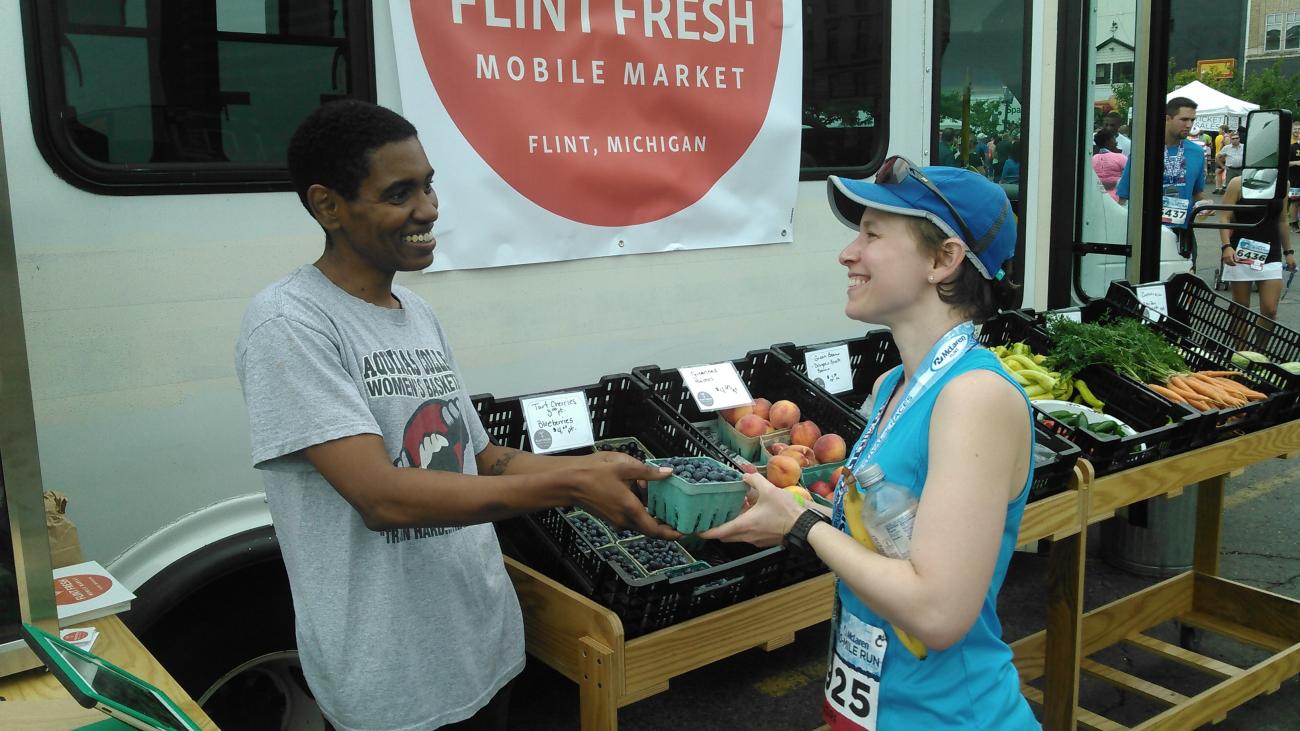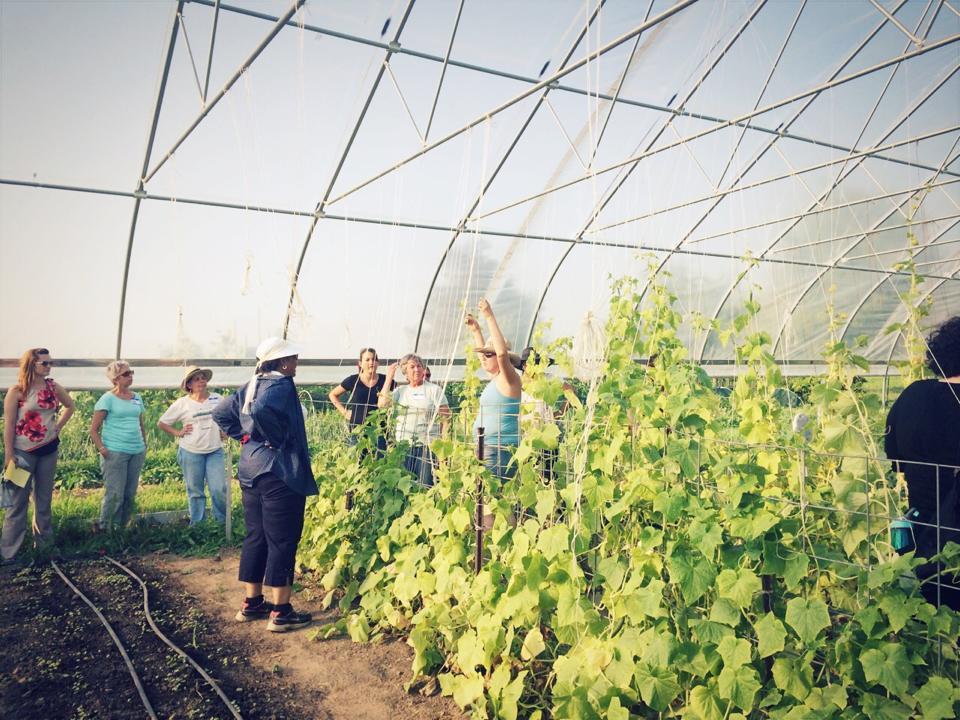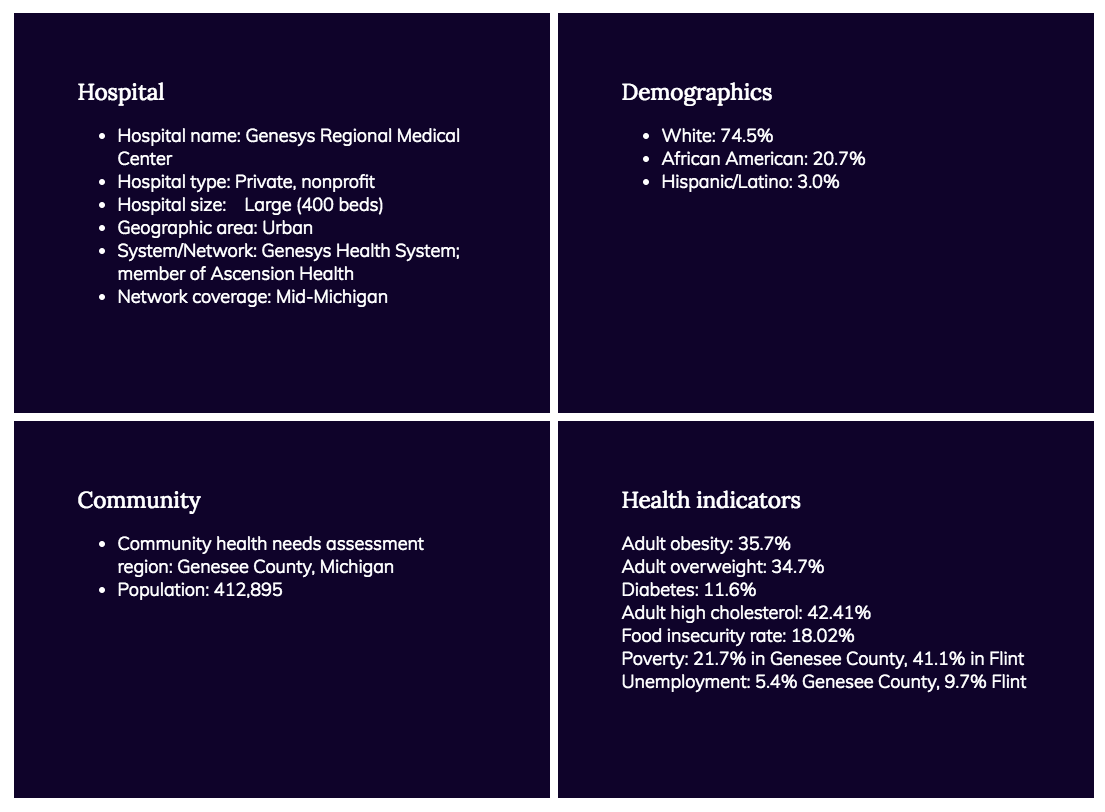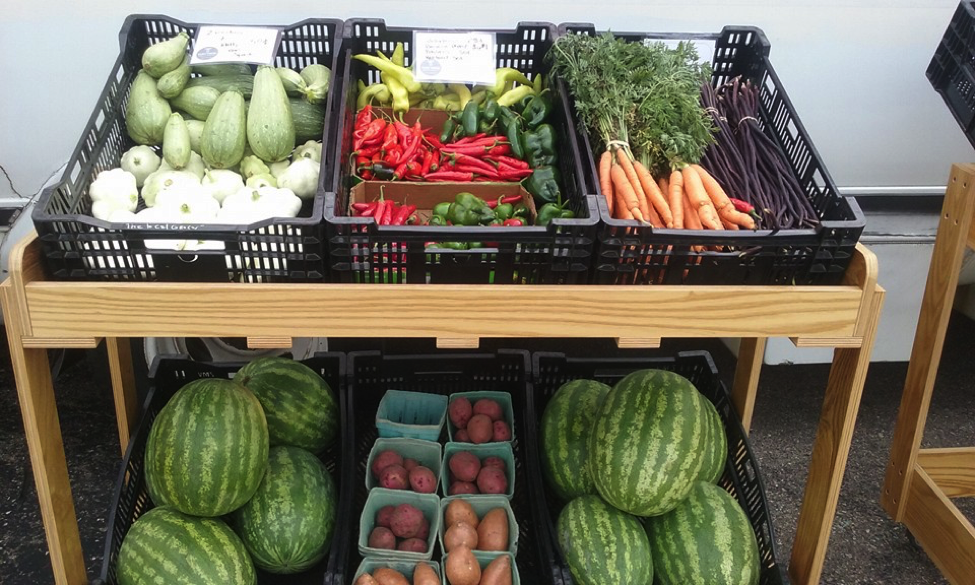Four years after the water crisis struck, Flint, Mich., residents still worry about the quality of their water. The tragedy galvanized community health organizations, breaking down silos and aligning need with opportunity. Now, hospital-supported initiatives are helping Flint residents recover, focusing on the healing potential of food.
While Genesys Regional Medical Center and a network of public health, health care, business, education, and governmental organizations have worked for years through the Greater Flint Health Coalition to advance a shared community health agenda, their efforts to address specific health needs remained largely siloed. In the aftermath of the public health emergency, this circumstance changed.
The crisis served as an urgent impetus to create food access opportunities with lead-mitigating foods as the centerpiece.
Enriched nutrients in food mitigate the consequences of lead exposure. In the wake of this disaster, partnerships and collaboration became an important factor in keeping the local food economy alive so these foods could be produced and distributed to those who needed them.
Nutrition and lead poisoning
Healthy eating can protect the body from the harmful effects of lead. Consuming foods high in calcium, iron, and vitamin C and eating regularly to avoid an empty stomach can minimize the amount of lead absorbed by the body and mitigate the effects of lead poisoning.
“Through our partnership with Michigan Food & Farming Systems, we are now growing healthy food and getting it into the community in a variety of ways,” says Susan Tippett, Genesys Health Foundation director of grant procurement. “This was work we should have already been doing, but the lead crisis brought the opportunity to the forefront.”
Jen Silveri, Michigan Food & Farming Systems (MIFFS) director, remembers “the reliance on collaborative partnerships became absolutely essential to the work we were doing to respond to the crisis.”
Fortunately, when the peak of the water crisis hit, the Women in Agriculture (WIA) Farm Development Center was already underway. The farm is an on-campus farm business incubator program and training center supported by Genesys and MIFFS. This unique partnership aims to educate farmers and grow women-owned farm businesses.
The concept for the farm grew out of the Women in Agriculture Network, established in 2014 by MIFFS and a small group of women farmers in the Genesee County area. Today the WIA farm thrives on three acres of the Genesys Health Park Campus. Run by a part-time farm manager, the WIA fields grow nine to 10 months of the year focusing on food crops that mitigate the effects of lead exposure, namely foods high in calcium, iron, and vitamin C, such as leafy green vegetables, peppers, and broccoli. The farm’s produce reaches the community through different channels, including an on-campus farmers market, a newly established produce prescription program (in collaboration with Hurley Medical Center), a local grocer, and several other hospital-supported initiatives.
“We are now engaged in the regional food system, and the farm is what gave us an entrée into that environment,” says Tippett, “This area of work is really where we’re going to begin to achieve population health and reach people upstream to keep them healthy.”
From water crisis to food sovereignty
Before the water crisis, Flint and Genesee County residents faced significant challenges. Nearly 200,000 people lived within Flint during its peak in the 1960s and 1970s. Out-migration following the decline of the auto industry led to urban decay, neighborhood blight, decreased home values, and falling tax revenues. Today, 99,000 residents remain, 57 percent of whom are African American.
Consistently high unemployment rates have contributed to growing intergenerational poverty and poor community health outcomes. Locals experiencing poverty and people of color are disproportionately impacted by pollution, crime, property abandonment, and lack of access to healthy foods.
In 2016, the Greater Flint Health Coalition assessed the community health needs of the city of Flint and Genesee County analyzing over 400 health-related indicators with an emphasis on social, environmental, and economic determinants of health. However, underlying a number of the top community health needs identified — obesity, diabetes, even the water crisis — was food insecurity. It was clear that access to and consumption of healthy foods was essential to having a healthier population.
Over the past 10 years, several community initiatives sought to address these issues through food and farming – these programs were collaborative from the start. Edible Flint, for example, a nonprofit organization and partner in several networks with Genesys and MIFFS, was started out of community conversations about healthy food access, productive reuse of vacant land, economic opportunities, and education on local food systems. This work, and subsequent projects like the WIA network and farm, set the stage for healthy food strategies to take root.
When the water crisis started, the WIA network focus shifted to disaster planning for farmers. There was a large influx of donated food to the Flint community because of the importance of nutrient-dense food in mitigating lead exposure. But the community needed a long-term strategy both to sustain farmers economically during this influx and to ensure that they would be able to provide food when this time-bound assistance expired.
“The crisis became a mechanism to bring together all of the partners who were already involved, as well as engage as new partners, looking at how to provide the support and services to both producers and healthy food seekers in the Flint community,” says Silveri.
Veggies to the people
“Keeping people healthy is as important as treating them when they are sick.”
— Jen Silveri, Michigan Food & Farming Systems director
“It is not just about equality, it’s about equity,” Tippett observes, “It’s about how do we get the right food to the right people in the right place at the right time so that we all stay healthy?”
With that in mind, food grown on the farm makes its way to populations lacking access in Flint and surrounding communities through several innovative, community-driven programs.
The Flint Fresh mobile market aggregates fresh food from more than a dozen local farmers and visits 10 neighborhood sites weekly to increase access to healthy foods. The market accepts Supplemental Nutrition Assistance Program (SNAP) benefits and participates in the Double Up Food Bucks program, so each dollar spent goes twice as far. Additionally, through the Flint Fresh Food Boxes program, about 80 boxes of local produce, aggregated from 20 to 25 farms, are delivered weekly to Flint residents.
More recently, Genesys has partnered with Hurley Medical Center, another hospital in the community. Hurley started a “Food FARMacy” program in 2017 and this spring, thanks to a grant from the Michigan Health Endowment Fund, partnered with Genesys to expand their program. Two Genesys community clinics are now able to prescribe fresh foods to patients to address food insecurity among those they serve in greater Flint. The WIA farm will sell leafy greens year-round to the FARMacy, bringing full circle a demonstration of community collaboration to achieve food equity for a vulnerable population.
Community benefit opportunity
Food-related health issues account for the four leading causes of death and are major drivers of health care expenditures across the country. Genesys’ projects exemplify the win-win-win opportunities that marry healthy food access, economic development, and local, sustainably produced food, as highlighted in the “Delivering community benefit: Healthy food playbook.” The playbook offers hospital professionals and community partners more than 30 resources and success stories from health care facilities across the country engaged in a variety of initiatives tackling food insecurity and diet-related disease to promote healthy food access and build healthier food systems through community benefit investments.
“We have really tried to think about how we can leverage our land to create a healthy community. Within that environment, the farm became kind of a perfect link,” Tippett says. “We know that we are getting the nutrient-rich, lead-mitigating food distributed to high-need communities.”



